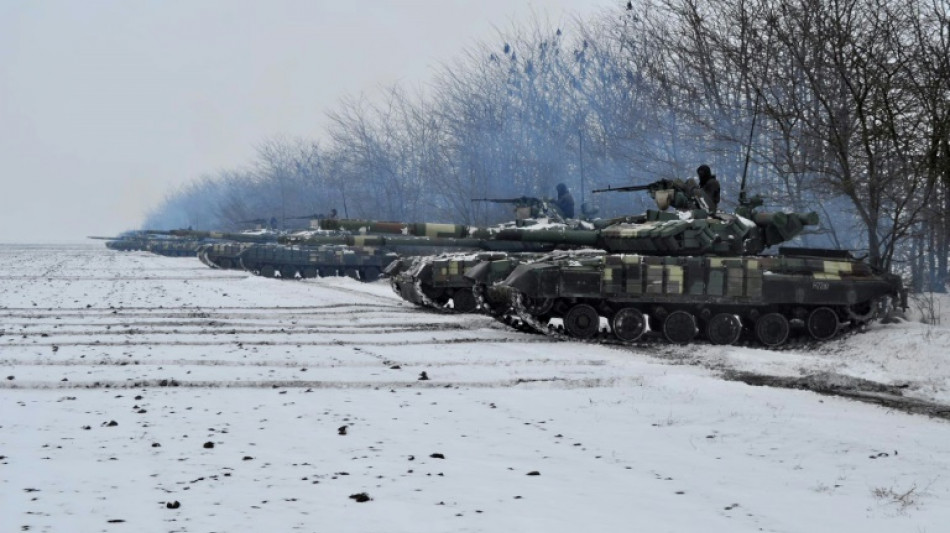

US says Russia could attack Ukraine 'any day' in escalation of alarm
The United States dramatically raised the alarm Friday over Ukraine, warning that a Russian invasion starting with civilians caught under aerial bombing could start in days and telling US citizens to leave within 48 hours.
An attack by the more than 100,000 Russian troops currently massed next to Ukraine "could occur any day now," White House National Security Advisor Jake Sullivan told reporters in Washington.
Dismissing speculation that the Kremlin would never trigger the crisis while the Beijing Olympics were still underway in close Russian ally China, Sullivan said such an attack "could occur" before the Games end on February 20.
The scenario of an imminent attack is "a very, very distinct possibility," Sullivan said.
While stressing that it was not yet known whether President Vladimir Putin had taken a decision, saying "we can't predict the exact determination," Sullivan made clear that the United States was bracing for the worst, including a "rapid assault" on the capital Kyiv.
"If a Russian attack on Ukraine proceeds, it is likely to begin with aerial bombing and missile attacks that could obviously kill civilians," he said. "Any American in Ukraine should leave as soon as possible, and in any event in the next 24 to 48 hours."
Sullivan spoke shortly after Biden and six European leaders, the heads of NATO and the European Union held talks on the worst crisis between the West and Russia since the end of the Cold War.
A US official said Biden would speak with Putin on Saturday, while the French government said that President Emmanuel Macron would also be calling the Russian leader on Saturday.
Underlining the bleak outlook, a string of countries joined the exodus of diplomats and citizens from Ukraine, while oil prices surged and US equities tumbled.
- Western, NATO unity -
Sullivan repeated warnings that Russia risks severe Western sanctions and said that NATO, which Putin wants to push back from eastern Europe, is now "more cohesive, more purposeful, more dynamic than any time in recent memory."
The Pentagon announced it was sending 3,000 more troops to bolster ally Poland.
Following the group phone call between US and European leaders, German Chancellor Olaf Scholz's spokesman said "the aim is to prevent a war in Europe." But if Moscow fails to pull back, "the allies are determined to jointly take swift and deep sanctions against Russia."
These sanctions would target the financial and energy sectors, EU chief Ursula von der Leyen said.
- Russia surrounding Ukraine -
Russian naval forces and troops, including units brought in from all over the vast country, now surround Ukraine to the south, east and north.
Russia, which denies any plan to attack Ukraine, already controls the Crimea territory seized in 2014 and supports separatist forces controling Ukraine's Donbass region in the east.
The Kremlin says its goal is to get NATO to agree to never give Ukraine membership and also to withdraw from eastern European countries already in the alliance, effectively carving Europe into Cold War-style spheres of influence. The United States and its European allies reject the demands, insisting that NATO poses no threat to Russia.
Adding to tensions, large-scale Russian military drills were underway Friday with authoritarian ally Belarus, which lies just north of Kyiv and also borders the European Union.
Russia's defense ministry said Friday it was also holding military exercises near Ukraine's border in the Black Sea.
According to the head of Norway's military intelligence service, Russia is operationally ready to conduct a wide range of military operations in Ukraine and the Kremlin just needs to make the call.
The top US general and his Russian counterpart talked Friday by phone, the Pentagon said, giving no details of the discussion.
And the European Union said its non-essential staff should leave Ukraine, while Israel said families of its diplomats were being pulled out. Norway joined Britain in telling its nationals to leave.
- Shuttle diplomacy -
The growing alarm comes despite efforts at shuttle diplomacy by European officials.
Macron visited both Moscow and Kyiv earlier this week and Scholz is expected to do the same in the coming days. Scholz will also hold his first in-person meeting with Putin in Moscow.
British Defense Secretary Ben Wallace was in Moscow Friday for rare talks with his Russian counterpart Sergei Shoigu.
He was accompanied by the UK's Chief of Defense Staff Tony Radakin, and the pair will also meet Russia's top army general Valery Gerasimov.
Wallace's visit comes a day after Britain's Foreign Secretary Liz Truss met with her Russian counterpart Sergei Lavrov in Moscow for talks that appeared fruitless and ended in mutual recriminations.
There was also disappointment after a separate meeting between Russian and Ukrainian negotiators, under the mediation of Germany and France. Sources described the meeting as "difficult."
In some of his starkest comments yet, Biden told NBC News on Thursday that Americans should exit Ukraine because "we're dealing with one of the largest armies in the world" and "things could go crazy quickly."
O.L.Jiminez--ESF




